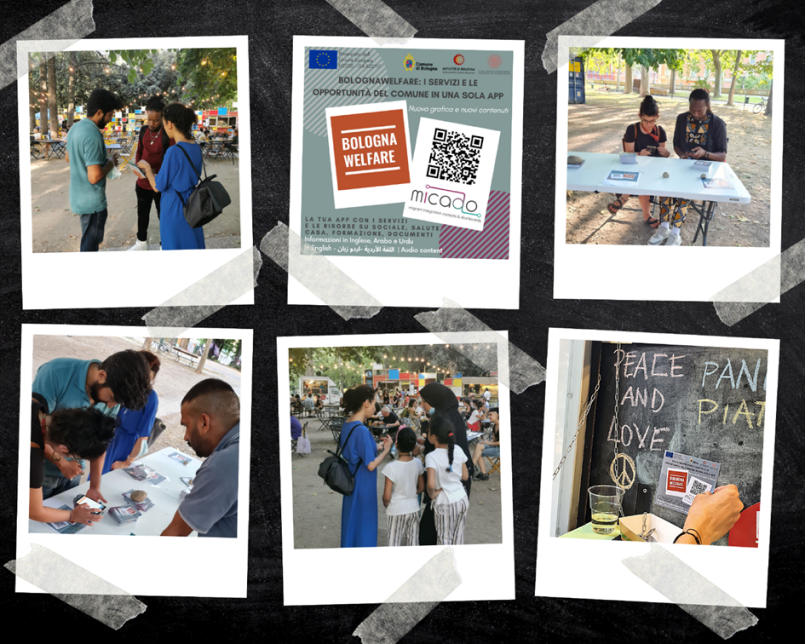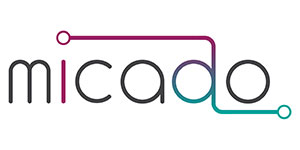
13 Jul Cities to adopt MICADO as long-term solution
In all four pilot cities, the uptake activities already started at the beginning of the project in 2019. In order to get the support of the relevant stakeholders, their involvement was essential from the very beginning. Only through active co-creation was it possible to develop a sense of ownership and commitment. The agencies concerned, which would later adopt MICADO, also had the chance to contribute their ideas and adapt the product to their local contexts.
Between January and June 2022, more than 65 uptake activities took place. This was accompanied by the finalisation of the local MICADO products, which were actively pitched to promising stakeholders. Overall, the response to MICADO has been very good. The product was convincing in the cities and showed the relevant bodies innovative and efficient ways for the future integration of migrants, refugees and foreign professionals.
In Hamburg, the composition of the team (municipal and scientific partners) allowed for an approach towards both, PAs and CSOs, actively involving them in the development processes. This strategy facilitated the development of a feeling of ownership, increasing the chances of long-term adoption. The Senate Chancellery focused on the PAs and the relevant authorities in Hamburg. This was primarily the Ministry of Labour, Social Affairs, Family and Integration (BASFI), the Senate’s Office of Digitalisation and the Digitalisation Department of BASFI. At the same time, other Hamburg partners (HCU, REM Consult) focused on the CSOs. There is a strong milieu of civil society initiatives that are active in the field of refugee work. Amal, a digital information portal that provides information in Arabic and Dari/Farsi about city events, and the Lawaetz Foundation, a Hamburg organisation that provides socially and economically disadvantaged groups of people with access to the labour, training and housing market, were found to be two strong partners.
The most promising case of uptake is the combination between civil society actors and the administration. Having the Lawaetz Foundation and the Hamburg Welcome Center raising their interest in MICADO eased the approach to the Social Ministry as these two organisations could confirm a legitimate proof of demand for such a solution. At the time of writing, there is a sincere interest to adopt MICADO by both, the City of Hamburg and the Federal State of Saxony. In the first case, MICADO will focus on the administrative integration processes for migrants and refugees and will hopefully be piloted in one of Hamburg’s Borough Offices. In the latter case, similar administrative processes will be facilitated for skilled workforce that the State of Saxony aims to attract from abroad. The final LESC meeting was held on 6th of May with all the stakeholders that accompanied the MICADO development in Hamburg.
In Bologna, the MICADO team (UNIBO, ASPBO and CSI) held talks with senior managers and officers of the Digital Service Department, the International Protection Department and the Welfare Department, all in Bologna Municipality. The public administration that has been directly involved is the Welfare and Promotion of Community Wellbeing Department of the Municipality whose Head has signed a “Manifestation of intention about MICADO project“ in March 2022.
The feedback as very positive and led to an agreement that targeted sections of MICADO will be integrated via an external link directly in the Bologna Municipality APP BolognaWelfare. In particular, the Municipality of Bologna finds it useful to adopt in the local context the step-by-step guides as well as the glossary. Audio content and the translation of information of the different welfare services will be integrated, as well as the access to the SPAD – Sportello Antidiscriminazioni (Anti-discrimination Help center) as agreed with the Head of Zonarelli Intercultural Center.
The progress was reported in the LESC meeting held on 20th of June. The MICADO team is now working to define contents as well as tackle financial and technical questions for the long-term adoption.
In Antwerp, since the beginning of the MICADO project in 2019, the landscape, both at regional-level (Flanders) and at city-level, has changed considerably in terms of digitalisation initiatives for the migrants’ integration sector, especially in the face of the Covid-19 pandemic.
MICADO was presented to the project manager appointed at Atlas and to the Flemish programme manager during the third and fourth quarter of 2021. This was the period when the Flemish digitisation programme was being defined.
As most successful outcome of undertaken uptake activities, we experienced the sharing of knowledge and insights in already running projects such as the App van’t Stad and the new applications that are being developed for customers of Social Services. In addition, the commitment from the Flemish Digitalisation programme to see how the lessons learnt, insight and concepts developed in the MICADO project can fit into the applications that are improved and/or developed in the projects making up the Flemish programme.
Fitting the MICADO solution into or as the tool for the Flemish government raises a lot of questions at the moment. The Flemish government has its own tools and ongoing agreements with IT suppliers. This makes the adoption of an open-source prototype like MICADO in this existing range a challenge.
The interested parties were interested in the evaluation report of the piloting phase and the business model to make further decisions. The last meeting of the Antwerp LESC carried on 14th of June gave the local team the chance to introduce this information.
In the case of Madrid, the main target group is the Public Administration, especially the Community of Madrid since they have been involved in the different MICADO phases. One of the main milestones is that the regional government of the Community of Madrid has proposed to include MICADO within a more global project, the Unique Social History (Historia Social Unica), a strategic project funded by European Funds. A meeting with Madrid Digital was held to study the technical aspects. Depending on the feasibility or technical barriers detected, following steps will be taken. In addition, meetings were held with the regional governments of the Canary Islands and La Rioja to present the MICADO solution. Finally, MICADO was also be presented to the Secretariat of State for Migration, under the Ministry of Inclusion, Welfare and Migration.
As far as CSOs are concerned, the public piloting highlighted the added value of MICADO as a place to gather valuable information regarding the most important aspects of migrant integration. For this reason, a meeting with the CSOs will be held in Madrid where MICADO and the future perspectives after the end of the project will be presented.
The administrative procedures followed by public administrations to adapt the MICADO solution has been considered by the Madrid team as a barrier. However, the public piloting underlined the added value for the CSOs that consider MICADO as a one-stop-information-tool. This opened an additional target to consider in the future after the project’s duration.
Challenges and Outlook
In all cities, the following factors proved to be a challenge: long-term funding for the maintenance and technical development of MICADO, hosting the product on the cities’ servers, product management and the associated decision-making about content.
Technically, the main issue was to clarify on which servers MICADO could be hosted in the long term. This implies questions of technical security, data protection but also human resources for the operation and maintenance of the software. For this purpose, the HafenCity University as project manager drafted with MICADO’s technical lead CSI a business case in which several different operation models are shown and explained. Hosting options range between using the local servers of the public administration, those of partner CSI as well as HafenCity University’s servers.
The commissioning, hosting and further development of MICADO is not only associated with technical effort, but also with financial resources. HCU and CSI have also provided a cost estimate for this.
A major point in discussions has been accessibility. Websites and web-applications need to be barrier-free for all users to be adopted. For this reason, an accessibility check has been commissioned to the IT-service-provider Dataport within the Hamburg solution. Results will however only become available after project end.
In all four project cities, the activities are not yet finished at the end of the project. Further meetings and discussions on local adaptation will also take place in the near future. In some cities, a complete adoption of the product is being discussed, while other cities will integrate parts of the product into existing IT systems.
